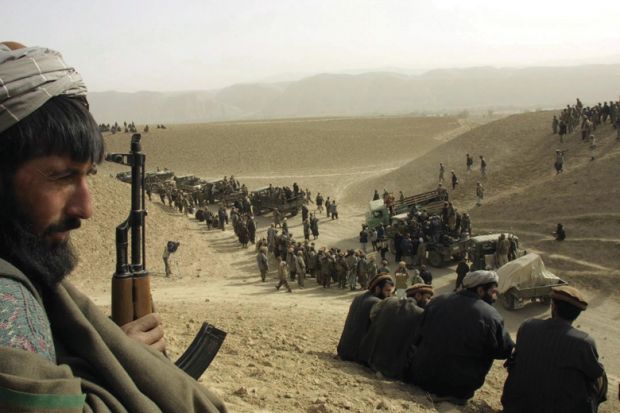Whether they are working in peaceful Portugal, in war zones or even looking into their own family backgrounds, ethnographic researchers can face some sharp ethical and practical issues.
Such challenges were vividly explored at a seminar organised by the UK’s Society for Research into Higher Education, where scholars heard about the “disjuncture between practical issues and debates about what counts as ‘proper research’” – a point raised by Emily Henderson, an assistant professor at the University of Warwick’s Centre for Education Studies, who opened the event, titled “In Depth and In Between?: Conducting Ethnographic Research on Higher Education across International Borders”.
One of the most obvious practical issues, in some environments, is sheer physical safety.
Adam Walton, a PhD student at the UCL Institute of Education, described his attempts to do “ethnographically informed research in higher education institutions, initially in Afghanistan and then eventually in Turkey”.
Since he spoke Uzbek, his initial plan had been to study “masculinities in higher education institutions in the Uzbek-speaking areas of north Afghanistan”. Yet just when he was preparing for an exploratory visit, he was told that his university didn’t think it was safe for him to go there. This meant that he had to “jettison over two years of work and understanding of Afghanistan and start to explore alternative research sites”. The detainment of a researcher on the Tajik-Afghan border scuppered another possible option, so he was eventually forced to go to Turkey, a country where he didn’t speak the language and about which he “was in effect completely ignorant”.
While the “risk aversion” of universities was “understandable”, Mr Walton went on, it “necessarily limit[ed] the locations” at which research can be carried out and often meant that the places that “arguably most need informed in-depth research insights” are turned into “no-go areas”. In the event, during his time in Turkey, there were “several bomb attacks in my city, including one at the bus stop I used every day which killed two students from my case study institution”.
Certain intellectual assumptions could also hamper ethnographic researchers.
Although academics are now “under pressure to be ‘international in outlook’”, noted Maria do Mar Pereira, assistant professor of sociology at the University of Warwick, they often learned that some places are more far more valued that others.
Herself Portuguese, she had studied for a PhD at the London School of Economics’ Gender Institute on “how [Portuguese] academics demarcate the boundaries of what counts as proper knowledge, especially feminist knowledge”. Her country’s position at “the semi-periphery of the global academic world” had a major impact on the career prospects of Portuguese scholars who had not spent time or been published abroad. But it also affected how her own research was perceived.
Portugal, Professor Pereira discovered, was regarded as “not international and exotic enough” by many anthropologists. But it was also seen as “a special case of limited interest”, unlike the US and UK, where research was unlikely to generate “authoritative knowledge which can be widely applied elsewhere”.
Another dilemma faced by ethnographic researchers was the question of how far they should draw directly on their own experience.
Jessica Gagnon, a research fellow at the University of Portsmouth’s School of Education and Childhood Studies, explored the challenges of “auto-ethnography”, which was often “misunderstood as narcissistic and self-indulgent”.
Her doctoral research had looked at “the university experiences of the daughters of single mothers in the United Kingdom”. Even Google searches soon revealed that single mothers were regularly dismissed as “easy”, “desperate”, “disgusting” and “bad for society”, or stereotyped as “benefit scroungers” and “welfare queens”. Many of her interviewees, Dr Gagnon discovered, had “internalised [such] myths and then insisted they were not [an example] of them”.
Since she is herself “a first-generation student from a working-class, American, single-mother family…researching within a country and cultural context different from my own”, she was both an insider and an outsider in relation to the topic.
But that left open the question of how she should bring her own background into the research. She dismissed the notion that academic writing had to be “stale, sterile and boring” and deliberately started her thesis with the words “I am illegitimate”, as a way of opening up the question of “who is considered legitimate within higher education”.
“I don’t think my thesis would have been legitimate without my experience in it,” she added.




